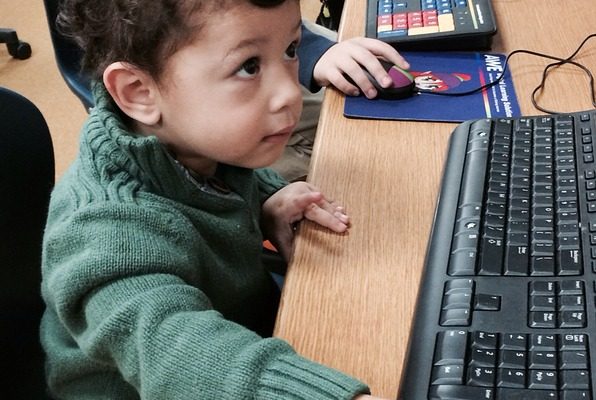Learning vs. Testing: Can Tech Bridge the Gap?

**The Edvocate is pleased to publish guest posts as way to fuel important conversations surrounding P-20 education in America. The opinions contained within guest posts are those of the authors and do not necessarily reflect the official opinion of The Edvocate or Dr. Matthew Lynch.**
A guest column by Edgar Wilson
Somewhere over the last few decades, teaching and testing developed an adversarial relationship in America’s classrooms.
Public policy debates swarm like bees over sticky questions on the issue of assessment:
How much is too much?
How can we evaluate teachers without standardized measures of outcomes?
Are students under too much pressure from high-stakes testing?
Are teachers “teaching to the test” at the expense of more comprehensive instruction?
The conflict and controversy is damaging to everyone involved in education—students, teachers, administrators, employers; everyone has an interest in seeing America’s schools be the best they can possibly be, but there is a lot of opinion and disagreement over what “best” actually looks like. In part, this is because we can’t even agree on how to measure quality.
Taking Advantage of the Digital Future
This may be another area where the field of education can learn something from the healthcare world.
In a presentation on the future of healthcare, Northeastern University professor Carl Nelson drew parallels between the field of management, and the evolution occurring in healthcare.
“We have the Big Data movement and data analytics not only providing appropriate diagnoses, but also guiding us all,” explained Nelson. “It can be used appropriately to guide decision-making, to make judgements.”
In essence, this means best practices growing naturally from more robust data.
Data acquisition in business, as well as in medicine, is occurring right at the point of implementation: wearable sensors, product-trackers, and communication systems all connected through the growing Internet of Things (IoT) enable data scientists to watch, live, as people and organizations operate. By aggregating social media statistics, watching how customers (and potential customers) interact with a brand, and what life events, interests, and behaviors correlate with consumer activities, businesses learn both about their customers, and themselves.
Examining all the data—passively generated and actively gathered—allows analysts to then identify shortcomings, inefficiencies, bottlenecks, and missed opportunities.
“We have moved greatly in the field of management from management based on intuition certainly, over a long period of time, to a management based on evidence (evidence-based management),” Nelson said. “The same thing is happening and has been happening in the field of medicine—so-called ‘evidence-based medicine’.”
In education, the challenge has been—and in many respects, continues to be—reliable sources of “evidence” on which to base changes to best practices. As in management and medicine, intuition and expertise has an important role in education: teachers often remark at the rewards in witnessing “Ah-ha” moments in the classroom. It isn’t something measured or captured in a discrete assessment; it is an organic thing, the look on a student’s face when the elements of a lesson all click into place, that whirring of mental machinery once the fuel of understanding is suddenly injected.
Where’s the Evidence?
The trappings of business and healthcare have been upgraded to support Big Data’s newly prominent role. Analysts review measures of existing behaviors, collected and recorded on the spot, and use them to develop new, evidence-based best practices.
Tablets, laptops, mobile devices and other digital tools and toys are destined for a prominent role in America’s classrooms; that much seems safe to assume given current trends.
And just as the Internet of Things, applied in clinical settings and connected to individual patients, doctors, and institutions is providing new troves of real-time data feeds and outcomes patterns, so too can applications be deployed in classrooms and attached to individual students to give instructors a new, closer, quantifiable look into what drives learning outcomes.
Mark Oronzio, CEO of Ideaphora, is one of the innovators working to bring formative assessment—measuring the learning process as it happens—to a place of greater prominence in the classroom.
“What we’re looking to do is provide a more automatic assessment of a knowledge map,” says Oronzio.
His company’s product is based on an existing concept, knowledge maps, as a way to graphically represent and record the learning process.
When learning is captured as it happens—rather than by a summative assessment, which is aimed at determine outcomes following instruction—real-time data can be provided to both students, teachers, and even data scientists looking to correlate instructional methods with on-the-ground results.
“Aside from it being what we call an Authentic Assessment—it’s not a multiple choice quiz, where I got tricked, or because I’m not a good writer I didn’t do well on the essay—this is making connections and defining connections,” Oronzio explains. “We think it would be a more accurate assessment; it is actually a picture of what’s going on, and the connections going on in the learner’s mind. The other cool thing about it is, it is not a discrete test, it wouldn’t have to be administered necessarily.”
This is the essence of competency-based education (CBE), an ongoing method of assessment that, at best, might help displace some of the emphasis on standardized testing and high-stakes tests.
Snapshots of Learning
Abundant data makes a compelling argument.
Adding the capability to watch, measure, and analyze instruction leaves less room for politics and opinion to dictate changes to curriculum and assessment standards. By combining the principles of CBE with a method of visualizing and recording the associated data, education has an opportunity to launch into the Big Data playground.
Just as in business and healthcare, the educational revolution comes not just from the devices themselves gaining widespread adoption, but from the programs and applications whose use they make possible. It is far from a nail in the coffin of standardized testing, but it does demonstrate how technology can combine with traditional instruction to provide new windows into the academic environment.
__________
Edgar Wilson is an Oregon native with a passion for cooking, trivia, and politics. He studied conflict resolution and international relations and has worked in industries ranging from international marketing to broadcast journalism. He is currently working as an independent analytical consultant. He can be reached via email here or on Twitter @EdgarTwilson.




